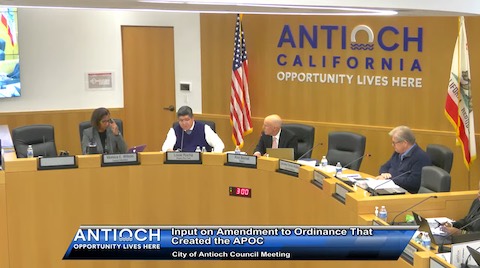
16 Oct Antioch Doesn’t Want Cops on Police Oversight Commission, Does Want More Authority Over All Commissions

(Screenshot captured by Samantha Kennedy / The CC Pulse)
By Samantha Kennedy
After months of the Antioch Police Oversight Commission facing challenges with attendance and decorum, City Council members on Tuesday cautiously endorsed giving themselves the authority to temporarily pause the commission’s meetings. But they rejected a proposal to allow officers from outside law enforcement agencies to serve.
The staff-authored recommendations drew opposition and confusion from four current or former commissioners and many residents over concerns about the body’s independence and for failing to align with APOC’s own suggestions.
The recommendations come months after the commission canceled several meetings because of low attendance, one commissioner’s appointment was put into question because of allegedly homophobic and racist social media posts, and another commissioner’s resignation following “several contentious interactions” with city leaders.
Commissioners agreed to revised recommendations, but the ones presented to the City Council did not completely incorporate APOC’s suggestions.
Concerns with the actual proposals centered around three items: the City Council’s authority over a temporary pause, commissioner background checks, and allowing officers from outside agencies to serve on the commission.
Council wants more authority over commission, acknowledges it’s a ‘slippery slope’
Mayor Pro Tem Louie Rocha and council members Monica Wilson and Don Freitas successfully pushed for a more consistent authority over all commissions, not just APOC.
The initial recommendation from staff called for language to allow a temporary pause based on the commission’s effectiveness and compliance with legal obligations, and taking into account “budget constraints, or shifts in city priorities.”
Staff will draft an ordinance that will give the City Council the authority to pause meetings for up to three months within a 12-month period. Future changes to keep all other boards and commissions consistent with APOC will also be made at a future meeting.
The proposal stems from a request by Mayor Ron Bernal to pause the commission and bring on new members earlier in the year. Commissioners blocked Bernal’s request at the time. Because the City Council does not have the authority to pause the commission, staff was directed to draft language that would give officials that authority.
“This is a slippery slope here,” said Wilson. “I don’t want it to be that we can pause them for whatever reason. There has to be an extreme circumstance and valid reasoning.”
Wilson, Freitas and Rocha also suggested that any changes to pauses should also be implemented uniformly across all boards and commissions.
“I know some people have conspiracy theories that the City Council or future city councils are going to try to start pausing and try to destroy APOC,” said Freitas. “I doubt that will ever happen, particularly with some of the audience we have here today.”
At the July 7 commission meeting, members’ concerns mostly revolved around the language being “too broad.” William “Brian” Addington, who initially presented the proposals to the commission, agreed to bring something back addressing that before it was shown to the City Council.
Cancel culture and ‘Back the Blue’: No background checks or cops
Opponents saw a decisive win in blocking any cops on the commission and requiring potential appointees to undergo a background check that would have included a social media check.
Residents said allowing cops on the commission reminded them of the so-called “Back the Blue” culture in its police department.
“The first thing that came to mind was what Back the Blue, no-accountability-for-APD-wanting persons came up with these recommendations?” said Nichole Gardner.
The recommendation would have meant that officers who live in Antioch but work for outside law enforcement agencies would have been allowed to be appointed to APOC.
It’s unclear if a particular incident led to the proposal of officers on the commission, but Addington told commissioners at the July 7 meeting that officers may have “unique insight” to bring.
Commissioner Lisa Elekwachi was the only commissioner at the July 7 meeting who voiced what she called “reservations” about the addition because, to residents, “the optics are bad.”
Kundinger told council members the suggestion wasn’t unprecedented. He pointed to City Manager Bessie Scott’s former employer, the Community Police Commission in Seattle, which allows officers to serve.
Vice Chair Devin Williams, who ran that July meeting in the absence of Chair Porshe Taylor, apologized to residents for “letting this slip through [his] fingers.”
“Oversight over yourself isn’t really how this should work. We should remain independent,” said Williams.
Commissioner Susan Kennedy and former chair Harry Thurston asked that the background check not include a review of social media posts. Kennedy cautioned what doing so might mean amid “cancel culture.”
“A review of social media creates concern in the climate of cancel culture that seems to be everywhere we turn,” said Kennedy, questioning who would do reviews.
The recommendation is months after now-commissioner Joe Mitchell’s social media posts were criticized by residents for being allegedly homophobic and racist before being appointed.
The social media review would have been a part of a larger background check that would have included fingerprinting and personal interviews.
“What do you do with it? Innate prejudice and bias come into the process,” said Freitas.
Proposed changes are not final. City staff will draft specific language to put into its ordinance and bring it back for review. Potential adoption would be at a future meeting.






No Comments